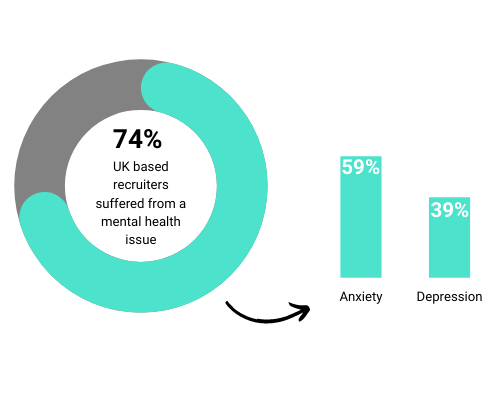
Recruitment is a superb platform for young professionals, graduates and top salespeople to develop their skills, understand how businesses are run and flourish as an individual.
The recruitment industry is known for its competitive, high pressure and driven nature. Research has found that recruitment is amongst the most stressful jobs in the UK but, we all need a bit of pressure to feel energised and productive at work right? Otherwise, we get bored.
Recruitment agencies want to make big money (fact), recruiters are put under constant strain whether it's headhunting, negotiating or placing candidates, they are expected to smash targets regularly. However, there’s a very fine line between ‘healthy pressure’ and stress. Stress leads to you feeling exhausted, burnt out and developing mental and physical health problems.
According to the Health and Wellbeing at Work 2021 survey by the Chartered Institute of Personnel Development (CIPD), 45% of employees have felt deterioration in their mental health since the start of the Covid crisis.
In our industry, men especially are accustomed to believing that showing emotion is a sign of weakness, data published by the Office for National Statistics confirms that about three out of every four suicides in this country are by men.
It is estimated that at least 74% of UK based recruiters have suffered from some form of mental health issue in the last year. Anxiety is found to be the most prominent, with 59% of people suffering from the condition, whilst 39% have experienced depression.

You’re probably wondering why should I be worried? Well, poor mental health is tricky for companies for several reasons.
This can result in:
- Disengaged employees
- Poor communication
- Reduced job performance
- Low productivity
- Poor decision-making
It is estimated that the average person will spend 90,000 hours at work over a lifetime. It is therefore crucial that employers take their duty of care seriously and protect the mental health and wellbeing of their staff.
Employer:
1. Encourage work/life balance
2. Have open and inclusive mental health conversations
3. Create a supportive environment (relaxation space)
Employee:
1. Share personal experiences with others
2. Practice self-care on lunch breaks (meditate or get some fresh air)
3. Look after your physical health
The law says applicants are under no obligation to tell an employer about a mental health condition. Under discrimination law, an employer must assess whether a candidate is the best person for the job based on their skills.
> It can benefit you to reach your objective of getting a job or performing well at your job
> Colleagues can offer support
> You can build an open working relationship from the beginning
> Employers may wrongfully assume you’ll be less productive/good at your job
> You may be afraid that others may discriminate against you
> Negative stereotypes

Our recruitment team have tasks that seem to be more important but, we don’t want anyone's mental health to be the last priority. We know that when it comes to daily wellness there is no one size fits all, things that work for some may not work for others.
So, we’ve made small steps to make sure we show empathy to not only our team but consultants too. Just by having a monthly catch up on how they’re feeling, encouraging healthy living and if they need personal support and regularly tracking progress not just in the review period.
As the mental health stigma continues to be lifted, we all, need to do our best to help those with their battles. So don’t be afraid to grab someone at lunch or pick up the phone and tell your employer how you're feeling, we're all human.
If you would like more information on how to recognise mental health we’ve attached The Mental Health Foundations brochure which includes an employer checklist for creating mentally healthy workplaces.
If you read this and felt it could influence someone please share!
Follow us on Instagram, Twitter, Facebook and LinkedIn for all the latest Inoltra content!
Back to Blog